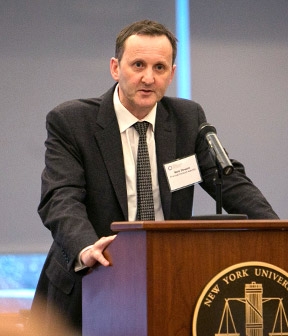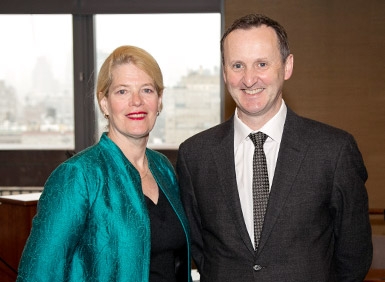Financial Conduct Authority’s Mark Steward discusses individual versus corporate accountability in conference keynote
The NYU Program on Corporate Compliance and Enforcement’s (PCCE) daylong conference, “The Expanding Scope of Individual Accountability for Corporate Misconduct,” assembled academics, compliance officers, enforcement officials, general counsel, and white-collar defense attorneys to discuss the evolving state of legal and regulatory enforcement.
Conference participants included PCCE co-directors Norma Z. Paige Professor of Law Jennifer Arlen ’86 and Stuyvesant P. Comfort Professor of Law Geoffrey Miller. The keynote address was delivered by Mark Steward, executive director of enforcement and market oversight at the UK’s Financial Conduct Authority (FCA), a regulatory body independent of the UK government that oversees financial firms offering consumer services and monitors the integrity of financial markets.
Steward focused in his speech on the FCA’s Senior Managers Regime (SMR), introduced in March 2016. The SMR was formed to place greater emphasis on senior managers’ individual responsibility to prevent regulatory breaches within firms. It was created, Steward said, in a context of “competing tensions” related to corporate misconduct charges, with financial firms complaining about being blamed for errant staff, employees arguing they were being scapegoated by their companies, and regulators and other enforcement authorities taking flak from the public for not bringing to justice those perceived as being at the root of wrongdoing. The SMR, Steward asserted, was an important step in the right direction.
“In the clinches, the different perspectives of both the firm and an employee are highly likely, if not inevitably, to be in conflict with one another on critical issues that affect one another’s liability,” said Steward. “In practice, these different perspectives on where blame and responsibility should rest also produce different attitudes towards litigation.” Many firms, he explained, want to resolve public disputes swiftly by accepting responsibility for the sake of minimizing reputational damage. Individual employees, on the other hand, often decide to fight charges. This disjunction, Steward added, could be problematic: “From a broad regulatory and law enforcement perspective, inconsistent verdicts and findings based on the same facts do not produce the best authority or precedent or clear bright lines for the rest of the market to follow.”
For these reasons, he said, investigators and prosecutors must assess all participants’ conduct holistically to avoid inconsistent outcomes. He noted that key questions include the manner and extent to which a firm’s culture affects employees’ conduct, how responsibilities are allocated among individuals, and whether employees have broader obligations to the wider community outside the firm itself: “What kind of wrong is committed by firms, and what kind of wrong is committed by individuals? Are they different? Are they mutually exclusive, or correlatives of one another?”
Steward suggested wisdom from the past could help. He invoked the ideas of eighteenth-century English jurist William Blackstone, who distinguished between private wrongs involving the violation of individual civil rights and public wrongs running contrary to the duties owed to a whole community. While many instances of corporate wrongdoing by a senior manager constitute private wrongs, Steward said, when employee misconduct affects others—for instance, through investor losses—it could be perceived as a public wrong.
“The Senior Managers Regime provides more than a legal framework,” he argued. “It responds to the public perception that individual liability often gives rise to more serious consequences, affecting not only trust and confidence in our markets but also the integrity of public rights and expectations and the well-being of customers—the community considered as a community, to use Blackstone’s words.” He added: “The overriding purpose of the regime is to improve genuine accountability in firms by removing ambiguous or bureaucratic structures that have impeded or obfuscated clear lines of responsibility within firms.”
Watch the full video of the keynote address (29 min):
Posted April 17, 2017



